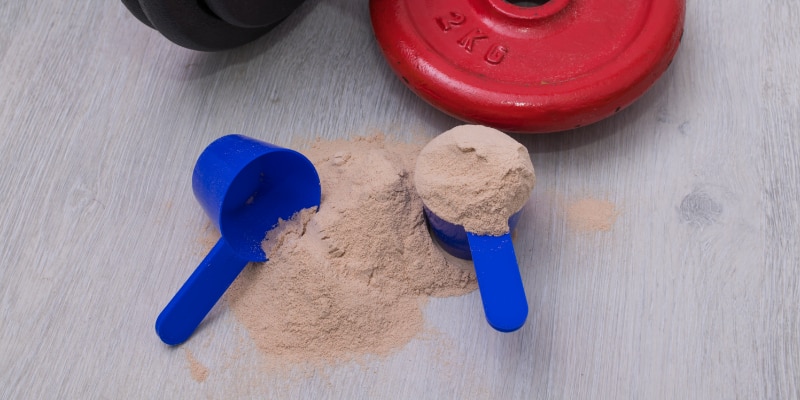by The Puritan's Pride Editorial Team
And while it is true these supplements are popular with bodybuilders and athletes, these are not the only people who can benefit from using these products.
In fact, as we age, consuming sufficient protein and other critical nutrients needed to maintain lean muscle and strength may be even more important than it is when we are younger.
No matter whether you are a man or woman, or what type of exercise you are performing, the right supplements can be a great addition to a healthy lifestyle.
So what is it about protein ingestion that makes it so important to consume on a daily basis as we age? Turns out that once we reach our 50s and 60s, our muscles don’t respond to protein intake the same way they did when we were younger. When we eat a meal that contains protein, our muscles respond by using the amino acids within protein to build new muscle. Our muscles are in a constant state of flux, with muscle tissue being broken down and rebuilt on a daily basis. While a meal with 20 grams of protein may maximally stimulate muscle building when we are in our 30s, this same amount may stimulate muscle building to a much smaller degree in a more mature adult. This age-associated decline in the response to protein ingestion is known as “anabolic resistance”.
This anabolic resistance doesn’t just occur with aging after eating a meal, but in the response to exercise as well. As we age, it is more important than ever to exercise on a daily basis to help maintain lean muscle, strength, mobility and flexibility. Shortly after completing a workout is a great time to consume a high protein meal or supplement in order to help your body recover and to support lean muscle. However, protein’s effect on muscle building after exercise is much smaller in older individuals. But don’t just take our word for it – let’s take a closer look at some of the data.

One of the first studies to look at the effects of exercise and muscle building in young and older subjects was conducted by researchers in the United Kingdom.1 In this trial, two groups of subjects were enrolled, one of which consisted of men with an average age of 24, and another group of men with an average age of 70. All subjects performed an exercise bout consisting of multiple sets of leg extensions and flexions, in order to work the upper leg muscles (the quadriceps and hamstrings).
The results found that the muscle-building response after exercise was 30% higher in the younger subjects as compared to the older subjects.
Researchers then conducted studies to test the effects of exercise on muscle building when various dosages of protein were given immediately after a workout. When studying younger adults in their 20s, it was found that 20 grams of whey protein maximally stimulated muscle building after performing weightlifting exercises for the legs.2 When 40g of protein was given, no further increases in muscle building were found over 20g.
However, when similar studies were performed in older subjects, different results were found. A trial published in the British Journal of Nutrition studied healthy men with an average age of 71 years old.3 Subjects were asked to perform knee extensions to exercise the thigh muscles, and then consumed 1 of 4 different beverages immediately after exercise that contained either 0g, 10g, 20g, or 40g of whey protein. Results found that 10g of whey protein had no benefits for muscle building as compared to the drink that contained no protein. While both the 20g and 40g drinks were effective for stimulating muscle building, the 40g drink increased muscle building measures to a much greater degree.
-When performing leg exercises, at least 20g of protein should be consumed after exercise to stimulate muscle building in both younger and older individuals.
-As we age, we need more protein if we want to maximally stimulate muscle building.
-Muscle is constantly being broken down and rebuilt on a daily basis. Therefore we need to make exercise part of our daily routine to support the rebuilding process in order to maintain what we already have.
-Whey protein is a high-quality protein that has been clinically studied to support lean muscle when taken with exercise.

If you’re looking to add a whey protein supplement to your diet to help bolster the protein you get from your regular meals, it can be overwhelming trying to pick the right product since there are so many choices in the market. Fortunately, Puritan’s Pride has several great choices to help you get started. Be sure to discuss with your healthcare provider before taking any supplements.
Whey Protein Deluxe: This is the perfect supplement to start with in order to reap the benefits of whey protein as found in several studies. Each scoop provides 18 grams of protein, which can be mixed with milk or soy-milk if you want to ensure you get at least 20 grams of protein as used in certain research trials. Or just add a little extra protein from a second scoop to get the amount you are looking for. This great tasting product comes in chocolate or vanilla, and mixes easily in water or your favorite beverage.
Whey Protein Isolate: Whey in the isolate form is a high-quality protein that undergoes additional purification steps to increase the percentage of protein in the formula while reducing fat and lactose levels. This is perfect for anyone looking for a more advanced protein supplement to add to their daily nutrition routine. Our Whey Isolate provides 30 grams of protein per serving, for anyone looking for extra support for their health and fitness program.
Soy Protein: For those with dairy restrictions who can’t add whey to their diet, we offer several Soy protein powders that serve as a great alternative. Soy is a plant based source of protein and has been used successfully for helping to maintain muscle and strength.

In addition to adding protein powders to your daily health and fitness routine, creatine supplements play a key role in energy flow.* While we typically don’t think about creatine as a supplement to take as part of a healthy aging routine, its benefits may surprise you.
Even if you are not currently taking a creatine supplement, you are ingesting it every day if you eat meat.
Creatine is naturally found in foods such as steak, beef, chicken, and fish, with red meat being particularly high in this compound. Therefore it may be especially important for vegans and vegetarians to consume a creatine supplement since they are not consuming any in their diet.
The majority of the creatine in our body is stored in our muscles, where it plays an essential role in muscle contraction.
Creatine is a key player in energy transfer within skeletal muscles.* It is especially good during short-term, high-intensity exercise.*
Inadequate creatine stores may result in early fatigue or exhaustion when performing challenging physical activity either in the gym or as part of your daily routine. And in order to maintain muscle and strength as we age, it is important that we continue to challenge our muscles with a weightlifting routine or similar resistance activity.
While supplementing with creatine sounds good in theory due to its essential role in muscle contraction, what do the studies with creatine supplements show? One recent study looked at the effects of creatine in combination with resistance training in subjects with an average age in the late 50s.4 Subjects were divided into two groups, one of which received a carbohydrate-only supplement, and the other who received creatine in combination with carbohydrates. The creatine dose was set at 0.1 grams per kilogram of body weight – which would translate into about 6.8 grams in a 150 pound individual.
After 8 weeks of training and supplementation, it was found that both groups increased muscle strength and physical performance as compared to their baseline values. However, the creatine group had even greater increases in leg strength compared to the placebo group. The authors concluded that creatine can be a beneficial addition to support healthy aging.
Puritan’s Pride offers several great options when looking to add creatine to your daily supplement routine.
Creatine Monohydrate Capsules 700 mg: These capsules provide a convenient way to get your daily creatine intake. Each capsule provides pure creatine as creatine monohydrate, which is the most studied form of creatine for providing muscle and strength benefits.
Creatine Monohydrate Powder 5000 mg: Creatine monohydrate powder is a highly concentrated source of creatine with no added ingredients. Perfect for mixing with whey protein to make a delicious smoothie after a workout or any time of the day. Each bottle provides 60 servings of creatine for an amazing value.
By adding creatine and whey protein to a daily exercise routine, you can help offset declines in muscle strength and physical functioning that we all face.*
Just make sure to start slow and work with your healthcare practitioner if it has been a while since you last engaged in a daily exercise routine. You may even want to consider working with a personal trainer who can help develop the best workout routine to meet your individual goals.
* These statements have not been evaluated by the Food and Drug Administration. These products are not intended to diagnose, treat, cure or prevent any disease.